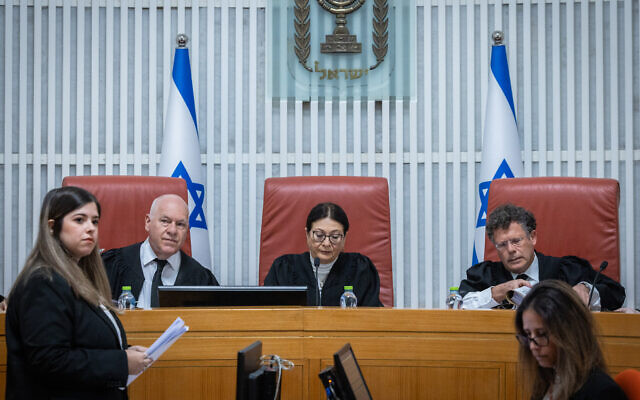I became your enemy because I tell you the truth
“You can fool some of the people all the time and all the people some of the time, but you can’t fool all the people all the time.” A. Lincoln
Justice minister’s draft legislation radically limits court’s capacity to strike down laws, bars it from intervening on Basic Laws, gives coalition control of appointment of judges
Justice Minister Yariv Levin published draft bills on Wednesday evening that will enact his radical program to remake the judicial system and strictly limit the High Court of Justice’s authority of judicial review over Knesset legislation and executive action.
The overhaul of the judicial system will grant the government total control over the appointment of judges, including Supreme Court justices; severely limit the High Court of Justice’s ability to strike down legislation; and allow the Knesset to re-legislate laws the court does manage to annul with a majority of just 61 MKs. The government will also be able to appoint a Supreme Court president and vice president who has not previously served on the Supreme Court, and potentially has not even served as a lower court judge.
Coalition officials have said the government aims to get the package of legislation passed into law by the end of March.
The proposals, which Levin partially outlined last week, have generated fierce opposition among a substantial portion of the general public, numerous jurists, and opposition parties who argue that the overhaul will remove all checks on government power and endanger the rights of minorities and weaker elements within society. Opposition Leader Yair Lapid has termed it “not legal reform” but “radical regime change.” Former Supreme Court president Aharon Barak likened the proposals to “poison pills” that will turn the country into a “hollow democracy,” leave citizens with no defense against the removal of their rights, and mark the beginning of the end of the modern State of Israel.
Levin and other proponents of the measure argue in response that the High Court has exceeded its authority in the last two decades and severely hampered the ability of elected coalitions and ministers to enact government policy. Prime Minister Benjamin Netanyahu, who appointed Levin when his coalition took office on December 29, is firmly backing the proposals, saying they will “strengthen democracy.”
Coalition majority on panel choosing judges
The main bill drafted by Levin and his office to achieve his goals is an amendment to Basic Law: The Judiciary.
According to the legislation drafted by Levin, the Judicial Election Committee, which is responsible for appointing judges — as well as for promotions to higher courts and dismissing judges if necessary — will be expanded from nine to 11 members.
The panel will include three government ministers, including the justice minister who will chair the committee; three MKs, one of whom is likely, but not certain, to be a member of the opposition; two public representatives to be chosen by the justice minister; and three High Court justices, including the chief justice.
This will give the government control over seven of the 11 committee members. A majority of six committee members will be required for electing High Court justices, and just a simple majority to elect lower court judges.
The legislation will also institute public hearings for candidates for the High Court, although if such a hearing is not held the committee will be entitled to appoint the candidate anyway.
Almost no means of judicial review
Crucially, the draft bill spells out the terms under which the High Court can exercise judicial review over Knesset legislation.
Although Levin’s Basic Law amendment will for the first time establish in law the court’s right to exercise judicial review, in practice the court’s ability to strike down or amend Knesset laws will be greatly weakened.
That authority has until now been largely derived from the passage of the Basic Law: Human Dignity and Liberty in 1992 and the landmark Bank Mizrahi ruling of the High Court in 1995.
Levin’s bill states explicitly that the courts cannot even hear arguments against Israel’s quasi-constitutional Basic Laws, and any decision issued by a court annulling or limiting one of the Basic Laws will have no validity.
This clause is being inserted into the legislation in order to prevent the High Court from stymieing it by immediately exercising judicial review over the new government’s reform package.
The High Court will only be able to strike down Knesset legislation if a full panel of the court’s 15 judges, less any of those unable to participate for various reasons, presides over the case. Additionally, any decision striking down legislation will have to gain the support of 80% of the panel, meaning 12 out of 15 justices if all High Court justices are present.
The Knesset will, however, be able to simply re-legislate the law for a four-year period with a vote of just 61 MKs — which all majority coalitions have — meaning that the High Court’s judicial review of Knesset legislation will be dramatically limited and easily overturned.
After that four-year period, a new Knesset could then re-legislate the same law, which would then be permanently immune from High Court review.
If the High Court strikes down a law in a unanimous decision, the Knesset would not be able to re-legislate that law during the tenure of that entire Knesset. However, a new Knesset could still subsequently re-legislate that law and override the court’s unanimous decision.
The abolition of ‘reasonableness’
Levin’s legislation also imposes another critical limitation on the court, namely removing the court’s ability to use the test of “reasonableness” to determine whether administrative decisions are “reasonable” and have been made with the proper consideration of all relevant factors.
The High Court over the years has used the principle of reasonableness to reverse several important government and local government decisions, including upholding religious rights, guaranteeing adequate protection from rocket fire from Gaza for civilians in the south, and annulling highly problematic political appointments.
The new government strongly opposes the court’s use of the reasonableness principle on the grounds that it is too amorphous and therefore grants the court undue authority over government policy.
Appointment of a Supreme Court president and vice president
Levin’s draft legislation also abolishes the tradition of “seniority” whereby the justice with the most years on the Supreme Court becomes president. Instead, the president and vice president will be selected by the Judicial Selection Committee “in the same way Supreme Court judges are appointed.” This would allow the committee to appoint any Supreme Court judge, a lower court judge, or even a private attorney who has never served as a judge but meets the criteria for an appointment to the Supreme Court.
The measure will give the current government immediate influence over the Supreme Court when current president Justice Esther Hayut retires this year.
The Supreme Court president has several important powers, including choosing the size and composition of panels in specific cases.
The term for a Supreme Court president and vice president will also be reduced from seven years to six.
According to a report by Channel 13 News, the legislation will be submitted to the Knesset by the end of the week, and presented to the Ministerial Committee for Legislation 21 days later in order to be approved for its first reading in the Knesset plenum.
“We go to the polls, vote, elect, and time after time, people we didn’t elect choose for us… that is not democracy,” Levin said last week when outlining the major components of his reforms during a press conference in the Knesset.
“These reforms will strengthen the legal system, and restore the public’s trust in it. They will restore order: It will allow the legislatures to legislate, the government to govern, legal advisers to advise, and judges to judge,” said the justice minister.
Opposition leaders have fiercely denounced Levin’s proposals, describing them as a political coup, while jurists, including former Supreme Court justices, have warned that the reform package will profoundly undermine democracy.
In a Times of Israel interview on Wednesday, the former deputy president of the Supreme Court Justice Elyakim Rubinstein warned that Levin’s reform package could lead to a “democratic dictatorship,” and said it would leave Israel with effectively just one branch of government: the majority coalition.
Opposition Leader Lapid, the head of the Yesh Atid party, told Channel 13 news that Levin’s reforms were the “abolition of Israeli democracy,” adding, “What they are doing here today – they are creating a situation in which the government controls everything. This is not democracy.”
All it takes for Evil to triumph is for good people to do nothing
Michael Loyman




